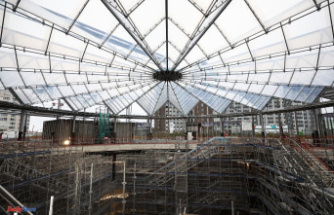In Germany there is a specter - that of a gas shortage. What will happen if Russia doesn't turn on the gas tap again on the important Nord Stream 1 pipeline? Then a hard winter threatens. Business associations are warning of a deep recession. The gas tap could have to be turned off, cities and counties are working on contingency plans. But is it really that bad? That depends on several factors. There is also hope. The federal government sees the gas supply as guaranteed over the summer. Their primary goal is to prevent bottlenecks at the beginning of the heating period in autumn and winter.
The current situation
Due to annual maintenance, gas is currently no longer being delivered via the Nord Stream 1 Baltic Sea pipeline. Russia had previously severely curtailed deliveries, citing technical problems. The big concern is that Russia won't turn on the gas again after the maintenance, which typically lasts up to 10 days. Will that happen? Nobody can say for sure. That could also depend on the delivery of a gas turbine from Siemens Energy.
The importance of memory
The gas storage facilities in Germany should be as full as possible by winter, which is the top priority for the federal government. According to the Federal Network Agency, the current filling levels are around 65 percent. They should be at least 80 percent full by October 1st and at least 90 percent by November 1st - so that Germany is well prepared for the winter. "As a society, we have to do everything we can to get the gas storage tanks full together over the summer," said Ingbert Liebing, head of the VKU municipal utility association.
The consequences of a Russian gas stop
"A delivery stop via Nord Stream 1 presents us with a huge challenge in winter," said Simon Müller, Director Germany at the think tank Agora Energiewende. Gas consumption in Germany is about three to four times higher in winter than in summer. Gas consumption is concentrated heavily on heating and hot water. Then comes the process heat in industry and the so-called material use, for example to produce fertilizers. A gas shortage cannot be completely prevented in the event of a total failure of Russian supplies: "However, we can contain the negative consequences."
Liebing said it would be difficult to get through the entire winter without Russian gas. Timm Kehler, head of the industry association Zukunft Gas, said that if Russian gas supplies failed, Germany would be missing 35 to 50 percent of the gas. If gas deliveries through Nord Stream 1 are not resumed, filling the gas storage facilities in Germany will initially be difficult. The missing quantity can only be procured to a limited extent from other sources.
Energy expert Claudia Kemfert from the German Institute for Economic Research (DIW) said that whether there really is a gas shortage depends on various aspects - the establishment of gas supply relationships with countries other than Russia, the constant filling of storage facilities and the saving of gas. "Horror scenarios and scaremongering are inappropriate," she said. "The biggest challenge anyway is that the entire economy and households have to deal with enormous increases in gas prices."
Role of LNG terminals
More liquefied natural gas (LNG) should make an important contribution to security of supply. So far, Germany does not have its own LNG terminal. The federal government has chartered four floating liquid gas terminals, the first of which is scheduled to go into operation in Wilhelmshaven this winter. Kehler said: "The most important lever to secure our gas supply now is to build the LNG infrastructure and put it into operation as soon as possible."
Save, save, save
A model by the Federal Network Agency with scenarios for Russian gas flows stated: "The domestic reduction in consumption is crucial to ensure our own security of supply and the necessary supply to neighboring countries."
"The more we take precautions now, the better we'll get through the winter," said Kerstin Andreae, head of the Federal Association of Energy and Water Industries. In order to store as much gas as possible, everyone can and must help - from industrial companies to individual households. "There are still ways to save energy in almost every household and in public buildings. Every kilowatt hour of gas saved helps us get through the winter better."
Coal-fired power plants that are in reserve are now to be used instead of gas-fired power plants to generate electricity - in order to save and store gas. Auctions are planned for industrial companies. In addition, the so-called fuel switch is to be made easier so that systems can be operated not with gas but with other energies such as coal or oil. The industry is already saving a lot of gas because of the high prices, said Kemfert. Households would have to be supported in saving gas, premiums would make sense. "Here there will be high burdens due to the high gas prices, low-income earners should be helped in a targeted manner so that the gas heating is not switched off." There are also many voices in politics for a new relief package.
"Every consumer can now do something, even if you are currently thinking more about cooling than about a warm apartment in winter," said Liebing from the VKU municipal utility association. "But: Almost 20 percent of the heat generated is required for hot water. For example, those who take shorter showers are already helping to fill the storage tanks. And with a view to the heating season, we should all lower our temperatures. A room temperature that is one degree lower saves up to seven percent of energy consumption."
Müller names measures that can be implemented in the short term, such as reducing the room temperature by one degree, hydraulic balancing of the heating systems and digital thermostats. "Anyone who can should also use alternative heating options: such as the wood stove. A new energy-saving shower head, new windows or a photovoltaic system - these are all savings options that can be realized relatively quickly."
Economics Minister Robert Habeck made it clear: In the event of a gas shortage, all consumers would have to make a contribution to saving energy. The federal government could enact energy-saving ordinances via the Energy Security Act. For example, it could be about lowering the specifications for minimum temperatures when heating. There is also an EU solidarity mechanism so that countries can help each other - but it is unclear what this would look like in an emergency.
What the emergency level means
The emergency would be the gas emergency level in the gas emergency plan - according to the definition, a prerequisite is a significant disruption to the gas supply. The aim of the plan is to secure "essential needs" for gas, with special attention to protected customers. These are private households, but also hospitals, nursing homes or the fire brigade and the police. However, companies could be switched off by the Federal Network Agency. In other words: companies could no longer produce. In this case, business associations expect massive damage to the economy.
It could be really expensive for taxpayers and gas customers. On the one hand, the federal government is negotiating a billion-euro rescue package with the ailing energy supplier Uniper. Uniper has to buy gas on the market because of the reduced Russian gas supplies. However, the group has not yet been able to pass on the significantly higher costs to its customers, which leads to liquidity problems. On the other hand, the federal government could also introduce a surcharge for all gas customers so that suppliers can pass on price increases.












